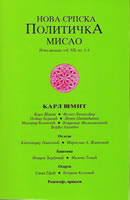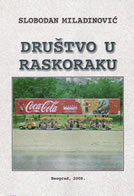| NSPM in English | |||
Serbia's elections |
 |
 |
 |
| петак, 09. мај 2008. | |
|
If you were to take politicians' election speeches literally – something one should never do, anywhere – you would think that Serbia is, once again, fighting for its independence and unity. Serbia's unity, they thunder, is threatened by the secession of its province of Kosovo. All major parties in Serbia agree that the US and EU member states' recognition of Kosovo is an outrageous assault on Serbia; yet all parties also agree that the Serbia should join the EU. The battle line in this election are drawn between those who want to join the EU as the only path to prosperity (regardless of the Kosovo question) and those who want to join only if the EU member states rescind their recognition of Kosovo's independence. The battle line hides a deep social cleavage: the supporters of the Radical and of the Socialist party, the parties most vociferous in denouncing the EU and its ‘robbery' of Kosovo, belong to the poorest, underprivileged strata - the pensioners, the unemployed and semi-employed, the unskilled and the semi-skilled. The supporters of the Democratic Party and its coalition for Europe belong to the middle classes and to the entrepreneurial elites who are the first to benefit from Serbia's association with the EU. With the unemployment close to 30 per cent and the average weekly wage of around 150 Australian dollars, it is understandable the majority of voters (67 and 56 per cent respectively) consider these economic and social questions – and not those of Kosovo or the integration into the EU - as decisive for whom they cast their vote for. The Democrats and their pro-EU coalition partners have a dismal record in addressing these problems. This is, partly, why they consistently trail behind the Radical Party. The Radicals combine a fiery nationalist rhetoric, demanding back Kosovo, with rather nebulous, populist economic programme favouring the underprivileged. And yet the electoral campaign is dominated not by the social and economic issues but by mutual accusation of national betrayal delivered with emotionally charged rhetoric. Both sides are playing on electorate's fears: the Democrats, on the fear of isolation and economic misery (which they claim the victory of Radicals and its coalition would lead to). For their part, the Radicals are playing on the fear of the subjugation to the EU to whom, they argue, the Democrats are selling the country for their own personal gain. The EU officials have openly backed the Democrats, promising further EU benefits, if their favourites win and threatening that if they fail to win, Serbia's door to Europe will be closed. As recent polls suggest, no party will emerge a clear winner from this election, able to form a government on its own. But, as in the previous elections, the Radicals, who are likely to gain a relative majority, will have to find one or more coalition partners in order to form a government. In spite of the EU officials' threats, a coalition led by the Radicals will not close Serbia's path to Europe; the Radical leader, Toma Nikolic, has always insisted that he wants Serbia's economic (as opposed to political) integration into the EU. The Radicals will thus be willing to negotiate economic agreements but are likely to reject any political conditions from the EU. The EU officials rightly regard the Radicals as much more troublesome than their favourites, the Democrats, but the former do not present unsurmountable obstacles to Serbia's cooperation with the EU. The EU may, of course, punish Serbia's electorate for its choice by withdrawing or delaying of its much needed and long promised economic assistance. If so, the losers in this election would not be the parties favoured by the EU, but the whole of Serbia 's population. On the other hand, even with a relative majority in the parliament, the Radicals may be unable (as they were unable in the past) to find a willing coalition partner. In such a case, Serbia will be left with a short-term caretaker government or a very shaky coalition cobbled together from pro-EU and Eurosceptic parties. The EU may indeed prefer such an outcome to a government led by the Radicals. Yet without an effective government – and with yet another election in a few months time – Serbia's economic problems are only likely to worsen. Even if the Radicals do not come to power, Serbia's citizens are bound to be the biggest losers of this election. No clear winners, but certain losers – this is the most likely outcome of the coming elections in Serbia . Ovaj tekst emitovan je na programu Perspektive, ABC Radio National, 9. Maja 2008".
|
Од истог аутора
Остали чланци у рубрици
- Playing With Fire in Ukraine
- Kosovo as a res extra commercium and the alchemy of colonization
- The Balkans XX years after NATO aggression: the case of the Republic of Srpska – past, present and future
- Из архиве - Remarks Before the Foreign Affairs Committee of the European Parliament
- Dysfunction in the Balkans - Can the Post-Yugoslav Settlement Survive?
- Serbia’s latest would-be savior is a modernizer, a strongman - or both
- Why the Ukraine Crisis Is the West’s Fault
- The Ghosts of World War I Circle over Ukraine
- Nato's action plan in Ukraine is right out of Dr Strangelove
- Why Yanukovych Said No to Europe

.jpg)




















